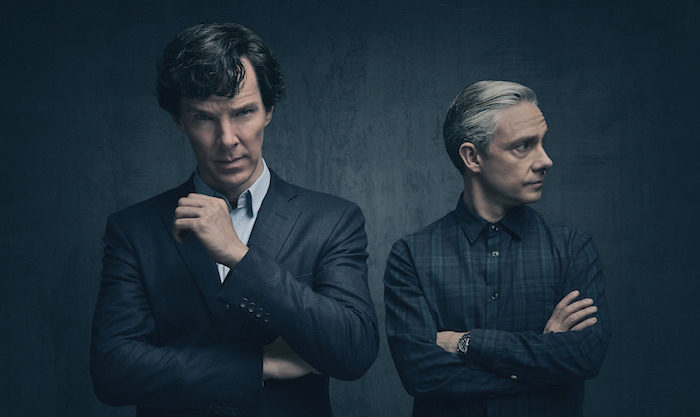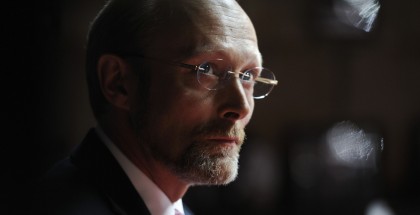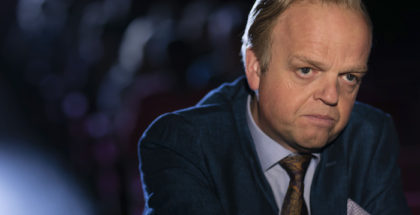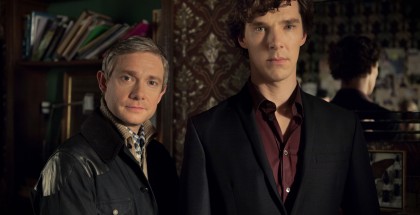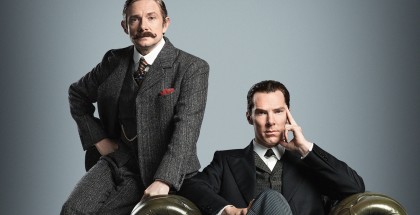Netflix UK TV review: Sherlock Season 4, Episode 1 (The Six Thatchers)
Review Overview
Cast
8Direction
8Script
4David Farnor | On 05, Jan 2017
Warning: This contains minor spoilers.
There’s a thin line between clever and clever-clever. In the past, the BBC’s modern reboot of Sherlock has walked it like Johnny Cash in his prime, allowing Sherlock to be clever-clever and the show to remain clever; one smug, annoying and insufferable, the other entertaining. In 2016, though, a New Year’s Day special crossed that line, as Sherlock disappeared up his own mind palace for an indulgent story with no real dramatic stakes. Clever became clever-clever in the worst possible way. A year on and the programme returns for its fourth run with an episode designed to have much higher, more real stakes – an ancient, death-laden tale, The Appointment In Samarra, is name-dropped early on – but the show still can’t help being too clever-clever for its own good.
We begin picking up events from Season 3, when Sherlock, you may recall, shot the villain to save John and Mary – and, specifically, to stop him from blackmailing John about Mary’s identity. That identity, you may also recall, was a secret agent for the British government. Because why have a wife for John Watson when you can have a spy? It was a simultaneously smart and silly thing for the show to do, attempting to give Mary Watson her own character and back-story, but also throwing out its central dynamic.
Co-creators Steven Moffat and Mark Gatiss have always enjoyed toying with Sherlock’s formula, moving into increasingly character-driven territory for their third season, peaking with Holmes’ best man’s speech at Watson’s wedding. But devoting time to Mary’s secret service antics only leaves the narrative of this episode feeling rather unbalanced – suddenly, Sherlock has an espionage mansion to go with its mind palace. It feels less like a detective programme and more like a would-be James Bond spin-off. Whatever happened to good old-fashioned deductions?
Certainly, The Six Thatchers is disappointingly light on the puzzling part – at least, in the conventional sense. Technically, we see the most sleuthing we ever have in a single episode, as Sherlock runs around with glee, following his return from almost-exile (Gatiss’ Mycroft doctors the footage from Season 3’s climax to make his brother look innocent). “Are those ginger nuts? I love ginger nuts,” Holmes exclaims, before going on to solve several cases a minute, firing off answers on his phone. (A highlight: “If the dog can’t swim, the neighbour did it.”)
It’s a thrilling start to the episode, with the first act doubling down on Sherlock’s newfound threesome. From racing to the hospital when Mary’s in labour to him texting during the christening of John and Mary’s baby (where he makes a vow to protect them), the cast have fantastic chemistry together, bringing laughs and fun to the table. It’s as close to a light-hearted caper the show has ever been, and a tantalising tease of a format that could almost work as a programme.
But alas, that’s not where this is headed. In Sir Arthur Conan Doyle’s original books, of course, Mary Watson isn’t a recurring character, and there’s a sense here that Gatiss is cramming in as much of Mary’s potential for plotlines as possible, before the show tries to focus more on John and Sherlock in the future. That means the second act of The Six Thatchers marks an uneven shift in tone; the busts of Thatcher, which give the episode its title (borrowed from Conan Doyle’s The Six Napoleons), are a gigantic anti-climax, taking us to Tbilisi and a story involving Mary that feels out of place. It’s not that it’s a bad show: it’s just a completely different one.
On the plus side, that means we get a cracking dose of action, including an underwater fight scene directed with 007-worthy class by Supergirl and Doctor Who helmer Rachel Talalay. On the downside, those niggles only continue to mount – particularly in one subplot involving John that sees Watson act entirely out of character with a woman on the bus. Martin Freeman’s portrayal of Holmes’ sidekick has gotten better with every episode, as the programme gives him more depth, but the show seems so keen to develop him further that it’s forgotten his roots.
It’s telling that the tale doesn’t really involve Sherlock solving anything either. His deductive powers, after being flaunted in the first half, only return at the end of the episode, when he goes into overdrive scrutinising the eventual culprit. Benedict Cumberbatch delivers it with a flourish of arrogance, though, that brings out a nastier side to his incarnation of Holmes – a cruel streak that ends up only making everything worse. It’s a intentional move, not unlike the show’s conscious attempts to move things on from Mary’s Season 3 revelations, but the fact that the latter is undoing a prior misstep, and the sheer amount of runtime this undoing takes up, leaves little room for the hubris and pathos the programme’s finale reaches for. Clever? Yes. Successful? No.
Underpinning the underwhelming atmosphere is the fact that the series still hasn’t resolved its Moriarty cliffhanger, which has now effectively been left hanging for several years. Whether it’s a fault of the marketing placing an emphasis on his “Miss Me?” message or not, it’s difficult to shake the disappointing conclusion to the episode, with only the reference to The Appointment in Samarra conjuring up any trace of ominous threat. Is it implying that Sherlock will meet his end this season? Or, given that we’re told Sherlock rewrote the story as a child to cheat death, is it telling us that anybody who does die in this show will be resurrected later on down the line? (After 2016’s inconsequential New Year’s special, the second, sadly, could be the more likely option.)
The result is an entertaining but sub-par opener for Sherlock’s fourth season. As a spy tale, it’s an entertaining one, but out of place. And as a detective mystery, it’s lacking in both detecting and mysteries. Either way, the most exciting thing about The Six Thatchers – sharks, swimming pool and swift prologue aside – is the promise of a better villain in the next episode, in the form of Culverton Smith. The knowledge that he’s played by Toby Jones (and even appeared on a bus stop in the background of one of The Six Thatchers’ scenes) suggests that Sherlock and Watson will have a more substantial story to play with. Here’s hoping normal service resumes soon.
Sherlock is available on Netflix UK, as part of an £9.99 monthly subscription. It is also available on BritBox, as part of a £5.99 monthly subscription.
Where can I buy or rent Sherlock online in the UK?
Case notes (spoilers)
– It’s a shame, in a way, that we don’t get to see the black pearl of the Borgias inside one of those Thatcher busts. It’d probably be more interesting than that AGRA USB stick.
– Speaking of uninteresting, did anybody guess the answer to the mystery of the boy in the car who ended up dead? The idea of him dressing up in vinyl as a car seat feels a little too Jonathan Creek.
– The big elephant in the room, of course, is Mary’s death, after Sherlock’s taunting of Norbury (the ice cream lady from the opening scene – pay attention at the back!) causes her to snap and shoot him – and Mary to jump in the way of the bullet. It’s hard to imagine anyone having a problem with Moffat and Gatiss writing Mary out, but there are surely better ways to do it? Not least because John, a military doctor, and Sherlock, a genius, seem just to watch Mary die, rather than actually attempt to save her life.
– “If it should ever strike you that I am getting a little overconfident in my powers, kindly whisper ‘Norbury’ in my ear,” Sherlock asks Mrs. Hudson at the end of the episode, in a hushed tone. For the Arthur Conan Doyle fans out there, they’ll recognise the line as a direct quote from The Adventure of the Yellow Face, in which Sherlock also makes a rare mistake and tries to learn from him. It’s great to see Sherlock’s character still being explored; if only it were in a better context.
– Speaking of which, Watson’s woman on the bus will no doubt turn out to be something more than just a sort-of-affair, in true Moffat fashion, but again, that could surely be handled better, without it jarring so heavily.
– Did we say Toby Jones’ imminent arrival was the most interesting thing to happen? We actually meant Mycroft picking up the telephone just before the credits and asking to speak to Sherrinford on the phone – a name that, in non-Conan Doyle books, has been taken to refer to Sherlock and Mycroft’s brother. Will we soon have three Holmes boys to deal with? Before you get too excited, remember how well adding Mary into the mix turned out…
Photo: Hartswood Films / Todd Antony


